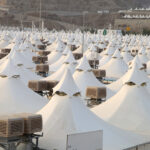Early this month, controversies surrounded the proposed adoption of a baby abandoned in Rigasa, Igabi Local Government Area of Kaduna State, when a US-based Nigerian couple indicated an interest in adopting the baby.
This caught the attention of the Kaduna State government, prompting the Commissioner of Human Services and Social Development, Hafsat Mohammed Baba, to stop the adoption of the baby as it believed the due process was not followed.
- Railway workers suspend warning strike
- Stop misleading Nigerians, Kogi replies EFCC over N19.3bn bailout fund
The owner of the Northern Hibiscus page on Instagram Aisha Falke had recently posted how the newborn baby girl was found near the residence of one of her followers after she was abandoned near a football field in the Rigasa area of Kaduna State.
After publishing the story on her page, the US-based couple were said to have indicated an interest in adopting the baby.
“They sent their family members who went to the police and finalised agreement, and the baby was handed over to them.
“They have already named her Amina (Jamilah), and the couple will come to Nigeria this week to take her to America,” Aisha said in an interview with BBC.
But the state’s Commissioner of Human Services and Social Development, Hafsat Mohammed Baba, said Kaduna has processes for adoption and it is only when such conditions are met, that a child can be handed over to new parents.
Our correspondent gathered that three to four babies are found weekly in the state, bringing a total of 12 babies in a month. There are also new cases of toddler abandonment.
Our correspondent further reports that Kaduna State has a strict child adoption process where families who want to adopt children must follow to logical conclusions before they are handed over the children. This also applies to private orphanages operating in the state.
Last year, the state government shut down a number of orphanages in its bid to sanitize the system. It also banned fostering and adoption of children due to abuse in some orphanages after it discovered that some orphanages were conduits for trafficking and abuse of children.
Confirming this, Hafsat Baba said, “We have closed down Unique Orphanage located in Sabon Tasha and she is facing charges of selling children in court.
According to her, “Sometimes, in a week, we get about three or four abandoned babies and sometimes we don’t get at all but actually, apart from babies we also have toddlers that are being abandoned. In fact, there is one small girl that I got from Yusuf Dantsoho, she is HIV positive so she was abandoned there by the family.
“She is now with us, and has started taking her medication and we are looking after her and there are also children from the orphanage we closed down. The owner was found trying to sell children.”
She said the challenges surrounding child adoption in Kaduna is not with the ministry but rather with the people, adding, “Because once they pick a child, they do not want to bring the child to government or even report. They will want to hold the child to themselves and at most, tell the village head who will give them the permission to keep the child which is not proper.”
She said Kaduna has a process for adoption and many people who find abandoned children and want to keep them, may not want to go through the rigour of that process so they rather keep mute about the child.
On the child that was found in Rigasa, she said, “We are still investigating the controversies surrounding that child. It happened because the person that was interested in giving out the children thought she was doing the child a favour by giving out the child even though she was not an authority.
“Honestly speaking, I have several letters from the police stating what transpired on reports when a child is picked and the ministry will be called in. In fairness to the police, they have rescued a child from Enugu and brought to our orphanage. That is why I do not believe that the police asked her to go with the child, the police know their job.”
She confirmed the child is with the ministry in a secure government orphanage, adding, “What puzzled us is Aisha Falke’s submission on social media where she claimed to have a system she uses to check the status of parents before she gives the children out. We are curious to know how she got these two children and we are worried about how many children she has given out without going through due process.”
She warned the general public to always follow due process if they want to adopt a child by coming to the ministry, filling a form and all other processes involved in child adoption.
She stressed, “Nobody has the power to give up a baby for adoption and that’s why we have laws. Kaduna State laws provide that whoever wants to adopt a baby from an orphanage or a baby that has been found, must inform the government.
Our correspondent who paid a visit to the Magaji-Gari orphanage where the baby found in Rigasa is being taken care of observed that there are quite a number of babies in the home which goes to show that many babies are being abandoned in the state.
Our correspondent further reports that the orphanage has about 30 children, the oldest being 12-years-old and the youngest 3 weeks. Babies form a larger percentage of children in the home with a total of about 12.
There is, however, growing concern over the rate of child abandonment mainly informed by teenage pregnancy. In this report, parents were urged to keep closer looks on their girls and provide them with counselling to stem the tide.

 Join Daily Trust WhatsApp Community For Quick Access To News and Happenings Around You.
Join Daily Trust WhatsApp Community For Quick Access To News and Happenings Around You.


